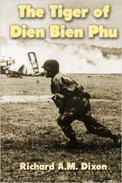
 |
Claude was not born with the heart of a killer. As a mixed-race child growing up in French Indochina, he never quite fit in with the Tonkinese residents of his mother's ethnicity nor with the pure French colonialists of his father's background. But while the ostracization was painful it was not enough to send him down a truly violent path. Even when taken on a tiger hunt by his father, he discovered that, while not afraid of the dangerous animal in front of him, he still could not kill it. But the harsh experiences of life can change a person and drive even the innocent into darkness.
Dixon begins his book with an older Claude creating a job opening for himself with the CIA in Bangkok by stalking and then garroting their local assassin in cold blood. Yet the narrative quickly shifts into reverie, as this is not so much a tale about the adventures of a covert killer but more of what happened in his past to push him to this point. When his father, a high-ranking French officer, is forced to flee from Indochina in the early part of World War II, young Claude leaves his mother and her family behind and accompanies him to North Africa. Not long after he starts to adjust to life there, he is kidnapped but manages to escape his captors. Unfortunately, in running from them he becomes lost in the desert. Near death from exposure and lack of water, he is rescued by members of a Bedouin salt caravan headed toward Timbuktu. The Bedouins allow him to join them on their journey and train him in their ways, ways that are sometimes filled with violence. While with them, he apprentices under a blacksmith named Hassan and learns to make his own saber, a weapon that will become a constant companion throughout his life.
Eventually, he is reunited with his father who has never stopped looking for his son and, with the war at an end, returns to Vietnam with him. Not long afterward, Claude realizes a long-held dream of joining the French Foreign Legion. However, even in training, death and danger follow him. After a German recruit tries to murder him Claude finds himself taking the other's life, instead. The First Indochina War affords even more opportunities for Claude to practice what he is becoming increasingly good at, and his success at stalking and eliminating the enemy soon earns him the nickname "Tiger." But Claude is fighting for a losing side, and the war and personal enemies of his father will result in the deaths of Claude's entire family, including his young wife and daughter.
The author has penned an intriguing and complex tale of the final years of French Indochina, as seen through the eyes of one who ended up being completely changed by the events of it. From his childhood flight from his homeland as a relative innocent until his disappearance into the guerrilla wars of Laos as a jaded killer of 45, Claude's story is one of heroism, tragedy, and a frustrated quest to belong. Despite what he becomes when trying to uncover the plot against his father and in later years, there is always a sense that at his core the protagonist is still a good man but one trapped in a destiny not of his choosing. The reappearance of the tiger, whether real or imaginary, at significant moments in Claude's life merely reinforces the idea that what is happening to him is not simply chance.
Dixon's writing is solid and vaguely reminiscent of the military fiction of Jack Higgins with a good dose of the fatalistic sensibilities of Joseph Conrad stirred into the mix. While it serves as a competent period piece, the book's thematic depth could easily propel it into the realm of literary fiction.